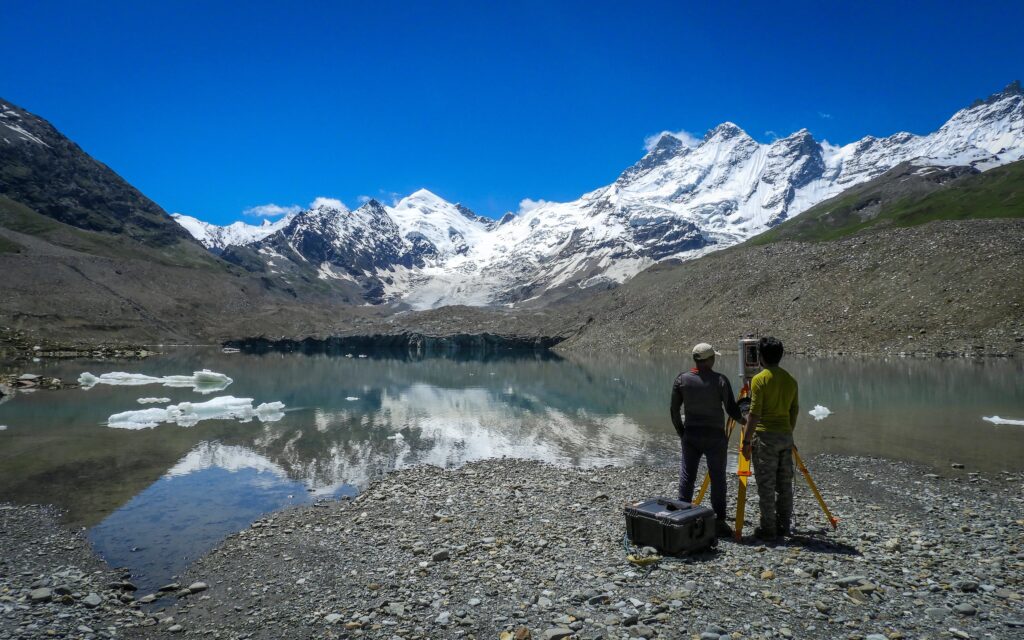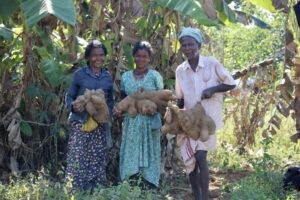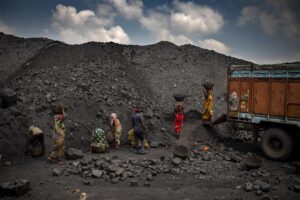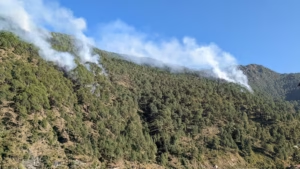‘Severe Consequences’ Of Further Warming In Himalayas: IPCC

Glaciologists monitoring changes at the Gepang Gath glacier in Himachal Pradesh (Image: Rakesh Rao/Climate Visuals Countdown)
As the world’s top climate scientists issued a “final warning” on the climate crisis with the release of the last part of the Intergovernmental Panel on Climate Change (IPCC)’s sixth assessment report, experts working in the Hindu Kush Himalayan region raised alarms over the risks of further warming to the mountains and glaciers that are the direct or indirect lifeline of nearly 2 billion people.
The IPCC AR6 Synthesis Report, which draws together the scientific body’s work over the past eight years, stresses that even under a very low greenhouse gas emissions scenario, global warming is likely to exceed 1.5 degrees Celsius this century, increasing the risk of food insecurity, extreme weather and conflict. At current warming levels, mountain communities are already experiencing landslides, flash floods and the drying up of springs.
The report says that changes to the cryosphere will have “severe consequences” in most mountain regions.
At the report launch, UN secretary-general António Guterres urged G20 nations to reach net-zero emissions by 2050. India, the current G20 chair and the world’s fourth-largest greenhouse gas emitter, has pledged to do so by 2070.
1.5C ‘Too Hot’ For The Himalayas
In 2019, a landmark report by the International Centre for Integrated Mountain Development (ICIMOD) found that the Hindu Kush Himalayas (HKH) are warming faster than the global average and that the consequences are more severe.
ICIMOD stated in its assessment that 1.5C is “too hot” for the HKH. David Molden, former director-general of ICIMOD, warned that warming of 1.5C will result in a 2C increase in the mountains. This would affect half the glaciers in the HKH region, destabilise Asia’s rivers and endanger the lives and livelihoods of billions of people.
The IPCC synthesis report says that the impacts on ecosystems of retreating glaciers and thawing permafrost are “approaching irreversibility”, describing these as “ecosystems with low resilience”.
Aditi Mukherji, one of the 93 authors of the IPCC synthesis report and director of the Consortium of International Agricultural Research Centres, told The Third Pole: “The report emphasises the need for better quantification of these losses and damages. We still do not have these quantified as well as the policymakers need. But they make one thing clear: the need for rapid, deep emissions cuts cannot be emphasised enough. Without that, impacts will continue to compound.”
Mukherji added: “Development in the Himalayas is not really going in the right direction. That is why we’re seeing the kind of subsidence as in Joshimath. We’re seeing the drying up of springs. We should get beyond the old talk of development versus environment.”
Reacting to the IPCC synthesis report, Amina Maharjan, senior specialist of livelihoods and migration at ICIMOD, told The Third Pole: “The projected changes in climate-induced hazards such as floods and landslides will lead to severe risk consequences for people, infrastructure and the economy.”
Maharjan described present adaptation responses in the Himalayas as “largely incremental” and focussed on early warning systems and diversifying livelihoods. “The present pace, scope and depth of adaptation response will be insufficient to address future risks,” she said.
Avash Pandey, assessment analyst for livelihoods at ICIMOD, said: “Given the importance of this region, in terms of the huge population dependent upon the mountain resources, it demands further inclusion of not only the issues the region faces due to climate change but also representation from this region in the entire IPCC processes.”
Strong Message For G20
In a video message at the report launch, António Guterres said he had “proposed to the G20 a Climate Solidarity Pact”. He called for countries to accelerate their net-zero transitions “in line with the principle of common but differentiated responsibilities and respective capabilities.”
In particular, he said, developed countries should commit to reaching net-zero closer to 2040.
“By the end of COP28 [the global climate summit in the United Arab Emirates scheduled at the end of 2023], I count on all G20 leaders to have committed to ambitious new economy-wide Nationally Determined Contributions encompassing all greenhouse gases and indicating their absolute emissions cuts targets for 2035 and 2040,” Guterres added.
India, the current G20 chair, will have its work cut out. Though the government is moving quickly to install solar and wind generation capacity, it plans to expand use of coal, the dirtiest of fossil fuels.
Limiting Warming To 1.5C Still Possible
The synthesis report says that carbon dioxide emissions must peak by 2025 if the rise in average global temperatures since the pre-industrial levels is to be kept within 1.5C. Delayed mitigation and adaptation action will lock in high-emissions infrastructure, raise the risk of stranded assets and escalating costs, reduce feasibility, and increase loss and damage.
This may be the subject of heated negotiations before and during this year’s UN climate summit, especially as 2023 is the year of the “global stocktake” on how nations have done to implement the pledges they made in the Paris Agreement.
“Trying to limit every slight temperature increase is essential,” Dipak Dasgupta of The Energy and Resources Institute and another synthesis report author, told a group of journalists after the report’s launch. He also pointed out that there are “multiple opportunities” to cut emissions: “The report tells us how to accelerate transitions, for example to deal with urban heat, water management, and energy transition.”
Approximately over 3 billion people live in “contexts” that are highly vulnerable to climate change, the synthesis report says.
Mukerji pointed out at the launch that between 2010 and 2020, human mortality from floods, droughts and storms was 15 times higher in highly vulnerable regions, compared with regions with very low vulnerability. With climate change and extreme weather increasingly driving displacement, “Climate justice is crucial because those who have contributed least to climate change are being disproportionately affected,” she said.
(Published under Creative Commons from The Third Pole. Read the original article here)





